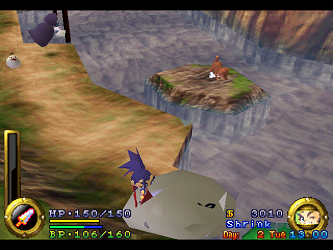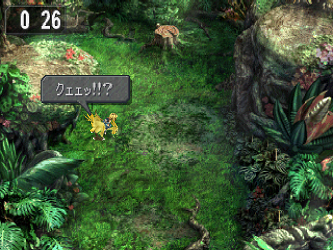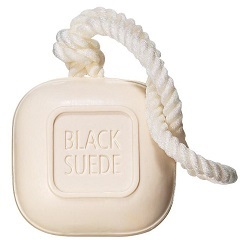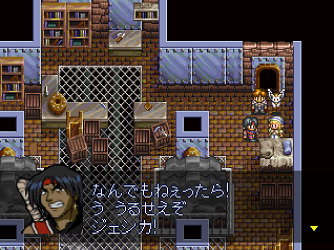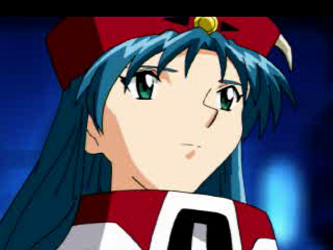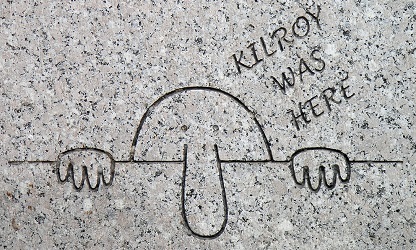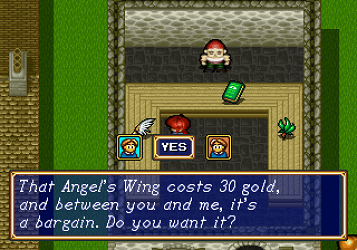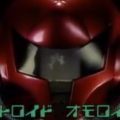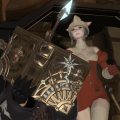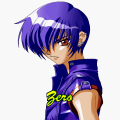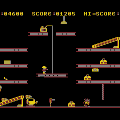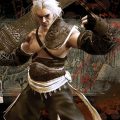Hello there!
My name is Hanenashi Error, and I’m the author of the Retro Game Super Translation series. The goal of these books is to highlight interesting translations from various video game localizations. However, I couldn’t squeeze all of them in, for a variety of reasons, such as:
- There wasn’t any room.
- They would’ve taken too long to explain in the space allotted.
- There were more interesting translations that covered the same basic concepts.
- They were difficult to explain in the monochrome printing used for the paperback version.
And so on. Even though I had done work capturing the images, many of them had to be tragically cut! However, rather than just having them sit unused on my hard drive, I decided to publish them here. If you’re still not sure what kind of books these are, this column should give you an idea, because the format is exactly the same.
The paperbacks are available on Amazon, along with Kindle versions.
▼Mischief Makers


Japanese:インテリアとしてかざるもよし… やわらかいオナカに顔をうずめるのもよし… ホオずりするのもよし…
“You can display it as an interior decoration… you can stick your face in its soft belly… you can rub its cheeks…”
English:He has many uses; Punching Bag, Door Stop, Paperweight, Answering Machine, etc…etc…
Professor Theo, the creator of the main character Marina, has been captured by the enemy and used as a prize for a field day contest. The enemies, called Nendoroids in Japanese, say that Theo has many uses, but the analogy differs between the Japanese and English versions. The Japanese version presents him as soft and cuddly, like a teddy bear, but the English version is much crueller and treats him like a “punching bag”.
▼ Bomberman 64: The Second Attack


Japanese:さらばだ…
“Farewell…”
English:We’ll meet again… Beyond the veil…
This is the dialogue when one of the bosses, Baelfael, is defeated by Bomberman. The phrase “Beyond the veil” is an idiom meaning “the unknown place after death”. Compared to the original, this sounds much cooler.
▼Alundra


Japanese:あたしは、毎日のようにあなたの夢を見ていたのよ。
“I’ve been dreaming about you every day.”
English:Your appearance is just as it was in my dreams, Alundra. Well… perhaps you’re a little shorter.
This is a bit of dialogue where a girl who had met the main character Alundra in her dream meets the real Alundra in the real world. In the dream, she seems to have imagined him as being a little taller. It’s a bit of flavor dialogue typical of the kind Working Designs added to their localizations.
▼Arc the Lad
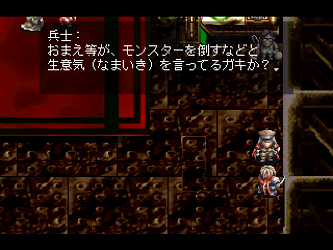
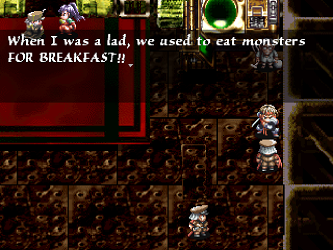
Japanese:おまえ等が、モンスターを倒すなどと生意気を言ってるガキか? 俺達軍人にまかせて、だまって言う事を聞いてればいいんだ。
“So you, a bunch of bratty kids, are trying to defeat some monsters? Just leave it to us soldiers and do as we say.”
English:When I was a lad, we used to eat monsters FOR BREAKFAST!! With a side of hash browns! And some juice.
Here’s a soldier who has an unusual rivalry with the main character, Arc. The English line makes the soldier talk with boastful bride in an exaggerated manner. Who knows what kind of monster he had for breakfast, but it was probably meat-based since it was accompanied with potatoes and juice. It seems like “dungeon food” has been a thing for soldiers for a long time.
▼Arc the Lad II


English:いい気になるな! 勝負はまだついちゃいねぇぞ!
“Don’t get cocky! The match isn’t over yet!”
Japanese:He who fights and runs away, will live to fight another day.
This line is said by a terrorist who is cornered by Elk, the main character, who then runs away. The Japanese line is a little generic, while the English line uses the famous idiom. There’s a similar idiom in Japanese, “nigeru ga kachi”, which literally means “to run away is to win”.
▼Brave Fencer Musashi ①

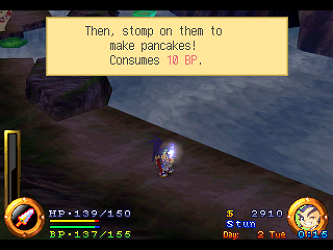
English:小さくなった敵はふみつぶせるぞ!
“You can crush shrunken enemies!”
Japanese:Then, stomp on them to make pancakes!
A description of the “Small no Jutsu,” a technique to make enemies smaller. The English translation is more colorful, suggesting that you squash them into pancakes. It’s not just a figure of speech, though, because when you step on an enemy, it looks like a pancake ↓.
▼Brave Fencer Musashi ②


English:サンキュー! サンキュー! じゃあね! じゃあね! バイバイ! バイバ~イ!!
“Thank you! Thank you! See ya! See ya! Bye bye! Bye Bye~~!”
Japanese:Thank you! Thank you! Gotta go! Gotta go! Bye bye! Bye bye!!
The Mercenary Mino speaks the same words repeatedly. The dialogue is the same in the Japanese original and the English translation (she even mostly speaks in English phrases anyway), but the English version has an interesting way of showing it by first putting part of the word in red letters, and then putting another part in red letters again when it is repeated. It’s a nice presentation that makes their individuality stand out.
▼The Legend of Zelda: Ocarina of Time


Japanese:その順番は… 2 3 1。「ニイさんイチバン」だッピ!
“The order is…2 3 1. “Nii-san Ichiban”! (“Big Brother is Number One!”)
English:The order is…2 3 1. Twenty-three is number one! (その順番は… 2 3 1。「23がナンバーワン」だッピ!)
This is the scene where you get a hint from the defeated enemy. It says that the three enemies ahead must be defeated in the order of “2, 3, and 1” or they will be resurrected. In the original Japanese version, the word for remembering “two, three, and one”, which is pronounced “ni”, “san”, and “ichi”. When “ban” is added at the end, this creates a little cheer-like pun that translates to “Big Brother is Number One!”. In the English version, it has been changed to “Twenty-three is number one”. The pun didn’t translate, but it still sounds like a sports cheer, and the most popular theory is that it’s a reference to Michael Jordan’s jersey number, 23.
“Horobita Star”
English:Rock Star (ロックスター)
The planet “Horobita Star” became a barren wasteland after its civilization was destroyed. This planet is mainly a stage of deserts and ruins. Because of the abundance of stones and rocks, the name “Rockstar” in the English version has a bit of a glamorous pop vibe. Perhaps a name like “Disastar” wouldn’t been more appropriate…?
▼Paper Mario


Japanese:マリオなら クッパなんて かんたんに やっつけちゃうよね!
“Mario can beat Koopa with ease!”
English:Mario can beat Bowser with one hand tied behind his back!
That might seem impossible, but since Mario can attack only by jumping anyway, maybe he has a chance?
▼Shadowgate 64


Japanese:ペンを手に入れた!
“Obtained a pen!”
English:You found a pen! This pen may one day come in handy. Plus its probably mightier than any sword!
This is the message you get when you get the “pen” item. The English version includes an added sentence related to the saying “The pen is mightier than the sword” to make the message more humorous. The most powerful weapon in the game is neither the sword nor the pen, but rather the staff.
▼Beyond the Beyond

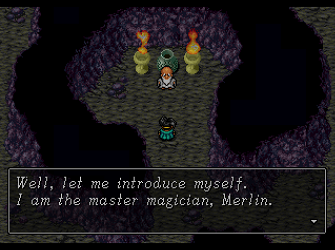
Japanese:よく ここを見つけて 訪ねてきたのう。この老人の住まいに人がやってきたのは 3百年ぶりじゃ
“I’m glad you found this place and came to visit. It’s been three hundred years since anyone has been to this old man’s home.”
English:Well, let me introduce myself. I am the master magician, Merlin.
Here, you meet an ancient wizard who has lived for at least 300 years. In the Japanese version, he is an old man with no name, but in the English version, he is named “Merlin”, probably after the sorcerer “Merlin” who appears in “The Legend of King Arthur”.
▼Dragon Warrior VII


Japanese:うん! わかった! 待ってるよ!
“Okay! Got it! I’ll be waiting!”
English:Bring back a trophy of your victory! Perhaps a necklace of fangs, an assortment of monster tongues, or even a Golem’s head!
In this scene, Patrick, the warrior’s son, cheers his father on as he heads for the tower. In the English version, he makes a lot of demanding requests for stuff to bring back. However, he may bring the “Golem’s Head” with him, since he will have to fight the Golem at the tower.
▼Final Fantasy IX


Japanese:ここほれ!チョコボ
“Dig here! Chocobo”
English:Chocobo Hot & Cold
This is a mini-game where you let your chocobo dig into the ground and hunt for treasure. If you dig far from the treasure, the chocobo will make a quiet “kwee” sound, but if you dig very close to it, it will make a more excited noise and so forth. In other words, depending on how close the Chocobo is to the treasure, he’ll make a different sound, which will clue you in on how to find it.
In English, “Hot and Cold” is a treasure hunting game played with at least two people. When the “treasure hunter” approaches the treasure, the person giving hints says “hot”, and when the “treasure hunter” moves away from the treasure, they say “cold”.. It’s very appropriate for the type of minigame this is.
▼Lunar: Silver Star Story ①


Japanese:せっけん 水浴びにはこれがないと。
“Soap. Use this for bathing.”
English:Soap. Rope not included.
This is the description of the “soap” item for sale at the store. In the English version, the description says, “No rope attached.” What does that mean? In English-speaking countries, there is a fancy soap with a string attached, called “soap on a rope”. Unfortunately, the soap sold at this store is just regular poor people’s soap.
▼Lunar: Silver Star Story ②


Japanese:な なによ! うるさいって どういうことよ!
“Wh…what! What do you mean, “Shut up”?”
English:Be quiet?! Is that how you treat the woman to whom you were about to confess your love?!
This is a scene where two childhood friends, Kyle and Jessica, argue with each other like a married couple. To summarize, Kyle is a womanizer and Jessica routinely yells at him – she’s a typical “tsundere” character – but they both have feelings for each other. In the Japanese version, there is a lot of prickliness (“tsun”) in the scene, but in the English version, there is a slightly joking hint of affection (“dere”).
▼Lunar 2: Eternal Blue


Japanese:なに デレデレしてんのよ! キィーーッ!
“Why are you looking so lovestruck? Geez!”
English:Let me tuck your tongue back into your mouth and wipe that drool off your chin!
This is the scene where the hero, Hiro, meets the heroine, Lucia, for the first time. Ruby, who is jealous of Lucia’s beauty, makes a snarky comment as he gawks at her. In the English version of the story, Hiro seems to have been so struck by Lucia’s appearance that he ended up drooling and puking all over her. It’s a reference to old cartoons like the ones from Tex Avery. Do things like this happen in real life…?
▼Mega Man Legends 2


Japanese:落書きだ。「リーバード サプライズド ユー」 どういういみだろう?
“It’s some graffiti. ‘ReaverBot surprised you.’ What does that mean?”
English:There’s something written on this… “Kilroy was here.” What’s that mean?
This is some mysterious graffiti found in the cabin of the airship. In the original Japanese text, “ReaverBot” is the name of the enemy robot in this game ” The “surprised you” is probably an homage to “the monster surprised you!” message from Wizardry.
On the other hand, “Kilroy was here” in the English version is a famous graffiti marking data back to World War II. It is a picture of a man peeking at you from the top of a wall with his long nose hanging down,
▼The Misadventures of Tron Bonne


Japanese:絶望って言葉を知ってるか? いまの状態を言うのさ
“Do you know the word “despair”? It’s the situation you’re in now.”
English:Ever hear the expression “Between a rock and a hard place?” That’s your situation!
The scene where the bird-shaped robot “Birdbot” catches up with you. In the English version, the word “despair” has been changed to the phrase “Between a rock and a hard place”. The meaning of the phrase is the same as in the Japanese original, but it makes the enemy sound a little smarter.
As an aside, these enemies are called “shitappers” in Japanese. Technically this translates to something like “subordinate” (“shita” means “below” in Japanese), but it’s obvious as to why this had to be changed in English!
▼Vanguard Bandits


Japanese:陛下! あの時の仕打ち、忘れはしませんぞ! 多くの民を! 臣下を! 妻を! 私は失ったのです!
“Your Majesty! I will not forget what you did to me! So many people! My subjects! My wife! I’ve lost them all!”
English:It is my wife’s blood that stains your hands, and it is your blue blood that shall adorn my sword!
A soldier named Savaro mistakenly believes that the king killed his lover, among many others, and attacks him. The dialogue in the English version is very cool. The phrase “blue blood” is not literally blue blood, but an idiom for “noble bloodline”, and since the other party is royalty, the expression fits the scene perfectly.
▼Shining Wisdom


Japanese:やくそう だね そいつは金貨10枚になるけど それで いいかい?
“That’ll be 10 gold pieces. Is that okay with you?”
English:That Healing Herb costs 10 gold, and between you and me, it’s a bargain. Do you want it?
When you try to buy medicinal herbs at the tool shop, the owner claims that he’s giving you a good deal. What a nice guy! But when you try to buy other items, the owner said the exact same thing. The prices are definitely fixed…
That wraps up everything in this column. Both Retro Game Super Translation Selection I and II, include even more interesting translations like these. Again, the paperbacks are available on Amazon, along with Kindle versions.
(This article has been translated from Japanese, which was originally posted here.)

